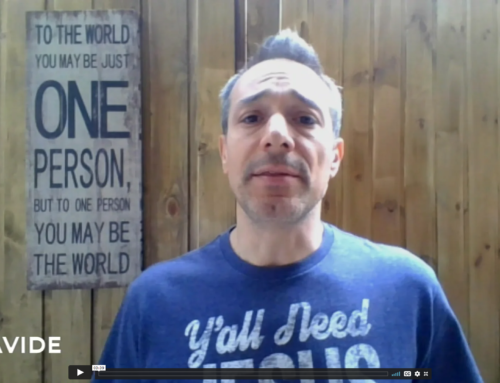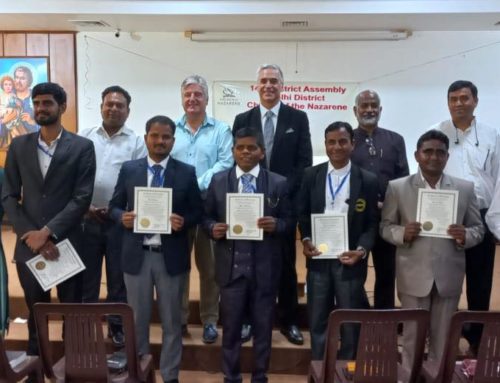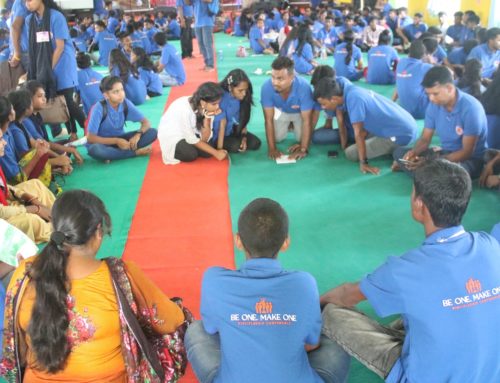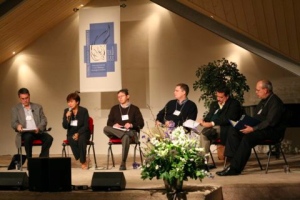 Wider Call for Papers
Wider Call for Papers
The Church of the Nazarene will hold its third Global Theology Conference in Nairobi, Kenya, on the campus of Africa Nazarene University, March 26 to 29, 2012. The Eurasia Region is calling for theological leaders who attend the conference to submit proposals for conference papers by December 10, 2010.
The conference is designed to be a global conversation among Nazarene leaders with the purpose of bringing together theologians and church leaders from around the world to reflect on the topic of “Critical Issues in Ecclesiology.” The purpose is to renew an understanding of the denomination’s place within the holy people of God, wrestling with the questions that surround this topic.
“In the past, I have enjoyed getting to know the leaders and theologians from across the world and discussing the various issues with them,” said Klaus Arnold, rector of European Nazarene College. “I enjoy getting a different input on issues that we discuss here, because, for example, if someone is from Africa or South America or Asia, they will have a totally different world view. I find this conference to be a very enriching experience.”
Among those who are invited to submit proposals are biblical scholars, theologians, church historians, postgraduate students, denominational leaders, district superintendents and pastors.
The conference has a series of desired outcomes, including:
- An increased clarity of the nature and mission of the Church of Jesus Christ.
- A renewed understanding of the place of the Church of the Nazarene within the One, Holy, Catholic and Apostolic Church
- A shared vision of the biblical/theological nature and mission of the Church
- A renewal of a biblical perspective on power and authority in the Church
- A challenge to any implicit ethno-centric shape of the Church
- An increased clarity regarding the nature, mission, authority and polity of the Church of the Nazarene in light of this shared vision.
Four questions will frame the discussion. Papers are invited to respond to one of the first three questions.
1. Where are we?
An informed awareness of our current diverse cultural, geographical, political and practical contexts will be important as the conference wrestles with the questions of unity and diversity in the Body of Christ.
2. How did we get to where we are?
An awareness of the historical influences that shape our current denominational beliefs and practices will provide the context for our discussion.
3. Who will guide us to where we need to go?
A renewed understanding of who we are as part of the people of God should emerge from the intersection of biblical models, theological reflection on the life of the people of God, and reflective Christian practice.
4. How are we to get there?
The answer to this question will emerge in discussions from the conference. An endnotes session during the final session will attempt to draw our discussions together.
Practitioners in ministry from the Eurasia Region may submit proposals in the form of an ABSTRACT or PROPOSAL of between 175-250 words to the Regional Program Committee chairperson (karnold@eunc.edu ) for consideration by December 10, 2010. If approved, they will then be invited to write the paper (6,000-8,000 words) and send it in by April 15, 2011. (Since this is a global multi-lingual conference, adequate time for translation is essential. Thus this due-date is fixed.)
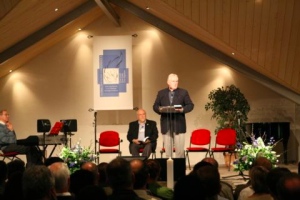 The first conference was held in Guatemala in 2001, and the second held in the Netherlands in 2007. A couple hundred leaders attended.
The first conference was held in Guatemala in 2001, and the second held in the Netherlands in 2007. A couple hundred leaders attended.
Arnold said a lot of the topics discussed at past conferences were quite stimulating and thought-provoking; so, he is looking forward to attending it again.
“Europeans seem to focus on the reflection part of theology,” said Arnold. “Some of the other world areas give more emphasis on the experiential dimension. There needs to be a healthy balance and so it is very helpful when we come together.”
In light of how the Body of Christ is rapidly shifting to the Southern and Eastern Hemispheres, conference planners expect the gathering to develop a shared vision regarding the nature and mission of the church. As the church is growing much faster outside of the United States, it raises a lot of questions, Arnold said.
“People are asking each other, ‘How do we address some of these changes?’” he said. “Is the structure of the Church of the Nazarene appropriate? Is the way that we have done things in the past still appropriate today?”
The four questions (mentioned above) that frame the discussion will need to be addressed before any denominational restructuring takes place. The conference gives a voice to the theologians who help with this important development within the church.
The International Board of Education (IBOE) and the eight regional education coordinators for the Church of the Nazarene globally serve as planning committee members for the conference. The Board of General Superintendents sponsors and guides the conference with all the regions coming together to attend. Conference participants are selected by the IBOE schools and by the conference planning committee.
{loadposition user2}
 Wider Call for Papers
Wider Call for Papers The first conference was held in Guatemala in 2001, and the second held in the Netherlands in 2007. A couple hundred leaders attended.
The first conference was held in Guatemala in 2001, and the second held in the Netherlands in 2007. A couple hundred leaders attended.
